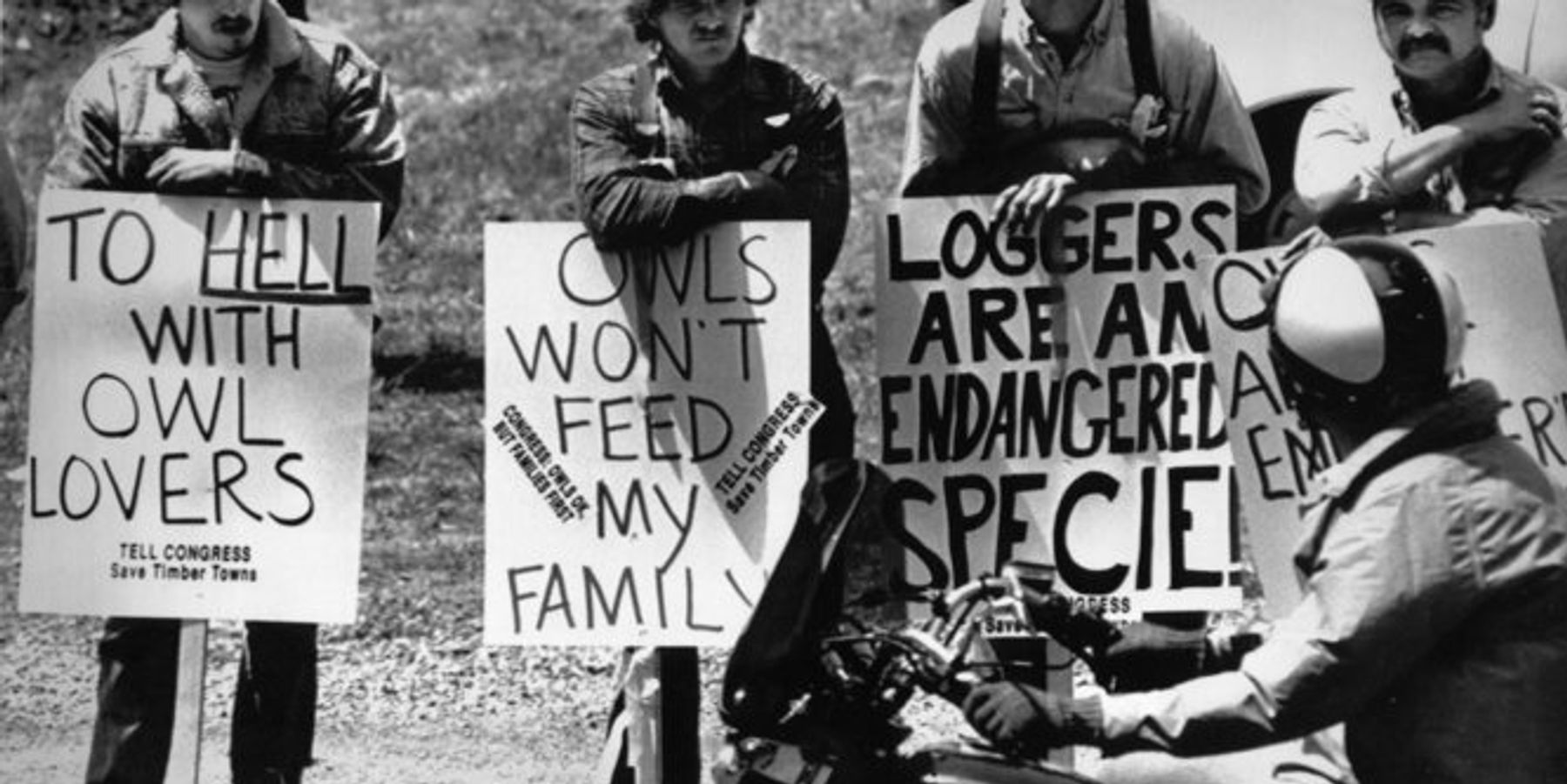
Profiles in Scourges, Part 3: A Western Rebellion Comes of Age. And Rage.
Weekend Reader for Sunday, Feb. 18
There is striking parallel between Ronald Reagan's environmental wrecking crew of years past and the current administration. Here is part 3 in a series looking back at Reagan rollbacks and characters.
Read part 1 on Reagan's Interior Secretary, James Watt and part 2 on EPA chief Anne Gorsuch.
In August 1980, a presidential candidate took the podium before his Salt Lake City supporters. "I happen to be one who cheers and supports the Sagebrush Rebellion. Count me in as a rebel."
The crowd roared. Three months later, they helped make the "rebel," Ronald Reagan, president. The Sagebrush Rebellion came to dominate politics in much of the west in the late 70's and 80's, but its sentiments were nearly a century old. The classic song "Don't Fence Me In" may have been written by a tenderfoot like Cole Porter, but it speaks for generations of miners and cattlemen who built the West.
Ranchers' ire at restrictions and the imposition of grazing fees simmered to the surface. Wayne Hage, a southern Nevada rancher, became a Sagebrush hero for defying federal grazing restrictions. His legal battle continued a decade after his death, culminating with a 2016 Supreme Court decision against him. A second ruling forced Hage's heirs to pay over half a million in grazing fees to the Feds.
The spotted owl hatches causes and cookbooks
Endangered species controversies didn't start with the Northern Spotted Owl. Shortly after the Endangered Species Act was passed and signed into law in 1973, biologists warned that a Tennessee Valley Authority dam project could exterminate a tiny fish called the snail darter. Americans took sides on whether a tiny fish with a comical name should stand in the way of human progress.
The new ESA also listed the Northern Spotted Owl as a "potentially endangered species." The owl and the timber industry share a fondness for old growth forests. Throughout the seventies and early 80's, state and federal officials plan a hodgepodge of buffer zones and protected areas for the birds. Unlike the snail darter, protecting the spotted owl was seen as threatening a major way of life and mode of commerce in the Pacific Northwest.
Conservationists' petition to list the owl as endangered was rejected by the Fish and Wildlife Service in 1987. In 1989, as loggers' protests mount and anti-spotted owl t-shirts and cookbooks hit the market, a federal judge halted 140 Forest Service timber sales to protect the bird. Logging restrictions, plus a nationwide housing slump, hit many timber towns hard. Hard feelings between loggers and environmentalists continue, and the "jobs-versus-environment" meme took an almost irrevocable hold.Owls and grazing rights were flashpoints, but government regulation brought multiple industries to the boiling point. Farmers balked at pesticide restrictions and the "Waters of the US" rule; Commercial fishermen, while acknowledging deep problems with the health of some fish stocks, fought against quotas and fishery closures; coal and oil workers found the ring of truth in the most daft climate denial theories. Rust-belt factory workers saw pollution controls as an end to their means.
Some of the movement's leaders found their absurd views to be taken seriously:
In 1995, Idaho congresswoman Helen Chenoweth held a hearing in Boise to investigate reports that ranchers were being visited by government "black helicopters" seeking to enforce the Endangered Species Act. (Society note: Chenoweth married Sagebrush Rebellion firebrand Wayne Hage in 1999.)
Texas congressman Tom DeLay went farther, playing the Hitler card by routinely referring to EPA as "the Gestapo of Government."
The sons and daughters of Sagebrush rose again in recent years. In 2014, Nevada rancher Cliven Bundy led an armed standoff with Bureau of Land Management officials over a million dollars in unpaid grazing fees. Two years later, Bundy's son Ammon led a month-long armed takeover of the headquarters of Oregon's Malheur National Wildlife Refuge.
In all, some of the hardest working American communities found common ground in resenting regulation -- and even hating the regulators, scientists, and environmentalists they held responsible for it. But they hardly arrived there by themselves. Conservative media like talk radio and Fox News provided a constant drumbeat; Lobbying titans like the U.S. Chamber of Commerce and the American Farm Bureau Federation provided inside clout. And a phalanx of conservative and libertarian funders provided the cash.
With its faux populism and pipe-dream pledges to revive the coal industry, the Trump Agenda makes full use of all of this resentment.
But it didn't invent any of it.
Top Weekend News
Quiet, dangerous milestone: An LNG tanker completed the crossing through the Arctic's Northeast Passage from South Korea to France without icebreaker support.This has been done in summer, but never in the dead of winter.
Opinions and Editorials
The editors of Outside rail against Trump's war on public lands. The piece includes a link to a Wilderness Society timeline of all the high (low) points.
Long Island's Newsday has a strong editorial on how President Trump's vow to "drain the swamp" has made things much, much swampier.
In recent months, the Mercer family has risen to prominence as benefactors of conservative causes, including climate denial. In Thursday's Wall Street Journal, Rebekah Mercer makes her case as the new Koch Sister.
In Grist, Yessenia Funes makes the case that the Green Sciences are still too white.
On this week's Living On Earth, Peter Dykstra and Steve Curwood discuss the horrific toll of murdered environmentalists , and the shrinking sales of Toyota's Prius.
Marshall Shepherd, former President of the American Meteorological Society, warns of the damage awaiting the National Weather Service through budget cuts.
This Week's Washington Rollbacks
The EPA took heat this week for reducing fines against the pesticide giant Syngenta.
EPA Administrator Scott Pruitt took heat of his own for lavish first class travel, which he claims is for safety reasons.
EPA's top Science Adviser has a history of dismissing genuine pollution problems.
After Kathleen Hartnett White withdrew her nomination to run the Council on Environmental Quality, another potentially controversial pick is being pushed.
In The Revelator, John R. Platt lists fourteen key environmental programs targeted in Trump's FY 2019 budget.
Civil Eats and The Conversation/US combine to look at how Farm Bill proposals will decimate farm-based conservation programs













